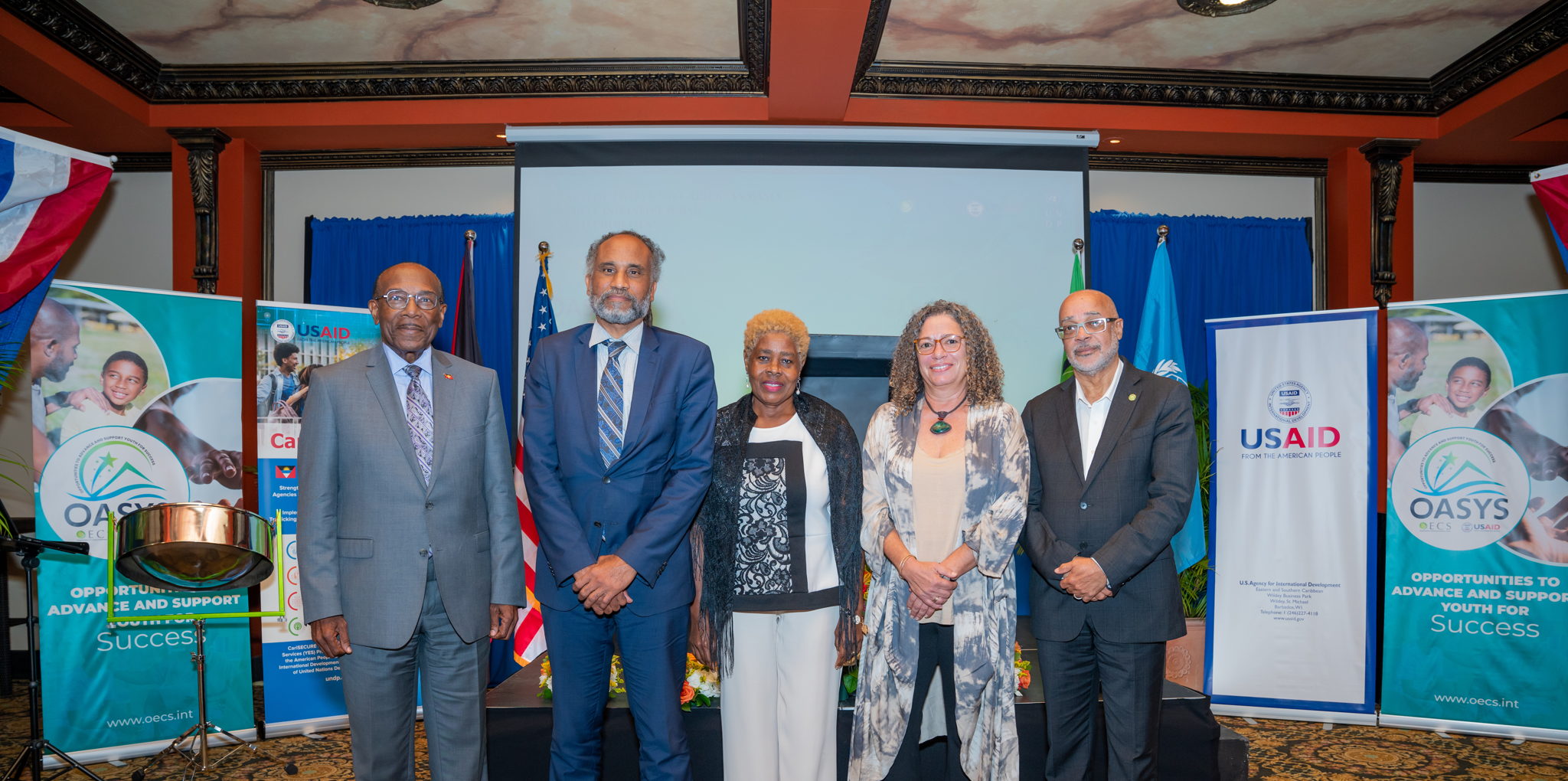Empowering Youth: Caribbean Basin Security Initiative Launches Innovative Projects to Combat Youth Crime
Joint Media Release
Youth crime is becoming an increasing challenge in the region, hindering sustainable development and economic growth. In this context, the United States Government, in partnership with the OECS Commission and United Nations Development Programme (UNDP) Barbados and the Eastern Caribbean, launched two of its Caribbean Basin Security Initiative (CBSI) projects aimed at stemming the rise in crime among youth in the Eastern Caribbean. The announcement coincided with the Eighth Meeting of the OECS Council of Ministers for Human and Social Development, and the Eighth Meeting of the OECS Council of Ministers: Education.
The projects-: Opportunities to Advance and Support Youth for Success (OASYS), and the Strengthening Evidence Based Decision Making for Citizen Security in the Caribbean (CariSECURE 2.0) will be rolled out in partnership with the OECS Commission and the United Nations Development Programme (UNDP).
Speaking at the launch which was held in Antigua and Barbuda, Regional Representative USAID/Eastern and Southern Caribbean, Mervyn Farroe, gave an overview of the two ground-breaking projects, emphasising the potential to transform the lives of at-risk youth in the region.
"USAID is committed to working with the government and people of Antigua and Barbuda to ensure that this country’s youth have the resources to reach their full potential and contribute positively to society. With our partners, we have strategically designed two programs to respond to the development priorities and challenges that Antigua and Barbuda is facing today.”
The OASYS project, implemented by the OECS Commission and in close partnership with the Ministry of Health, Wellness, Social Transformation & the Environment, will aid in moving youth away from the courts, and towards rehabilitation programs. In addition, the OASYS project will ensure that the rehabilitation centres and diversion programs use evidence-based diagnoses to treat and facilitate the reintegration of youth into society after leaving rehabilitation centers. OASYS is aligned with the OECS Youth Empowerment Strategy (OECS YES) which creates an enabling environment and expanding opportunities for all the youth of the region to realise their potential and fulfil their responsibilities. The project will be implemented in Antigua and Barbuda, Dominica, Grenada, Saint Kitts and Nevis, Saint Lucia and Saint Vincent and the Grenadines, and will conclude in October 2026.
His Excellency, Dr. Didacus Jules, Director General of the OECS noted that:
“OASYS builds on the work done during the previous USAID-funded Juvenile Justice Reform Project (JJRP) which aimed to transform the youth justice system to provide opportunities for diversion, rehabilitation, and reintegration of youth in conflict with the law. As a result, OASYS will continue the work started by the JJRP. One of the first objectives of OASYS is to amend the current Child Care and Child Justice Legislation in Antigua and Barbuda to create a landscape for the protection of children and all young people in this country."
CariSECURE 2.0, a program implemented by the United Nations Development Program, is a collaboration with the Ministry of Legal Affairs, Public Safety, Immigration and Labour. The project team will work with various agencies in Antigua and Barbuda to improve their capacity to identify, investigate, and prosecute cases of human trafficking. This project will also support policies and interventions that protect vulnerable populations, reduce crimes that exploit and dehumanise victims for profit, and hold perpetrators responsible.
UNDP Regional Representative a.i, Ugo Blanco, highlighted the program's potential impact:
“CariSECURE 2.0 builds on the work of its predecessor to use data to positively support Governments reduce incidences of trafficking in persons as well as reduce youth crime. With data, decision-makers are better able to inform strategies that will reduce incidences of trafficking in persons, crime and protect our youth.”
The Director General of the OECS, Dr. Didacus Jules, and the UNDP Regional Representative a.i., Ugo Blanco, expressed their gratitude to the U.S Government for its unwavering support in tackling youth crime in the region.

.jpg)
.jpg)
























.jpg)
